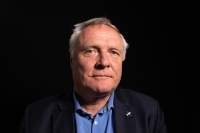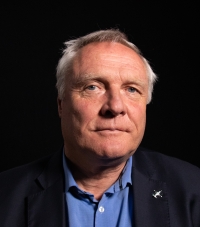We have to learn all our life

Download image
Bohuslav Dvořák was born on May 8, 1960 into a teaching family in the South Bohemian village Kaplice. He spent his childhood in Frymburk on the banks of the Lipno reservoir. After finishing primary school in 1975, he joined the Prague vocational school Motorlet (formerly Walter), which produced aircraft engines. His love of flying led him to the army. While still at the vocational school, he applied for a membership in the Communist Party of Czechoslovakia (KSČ). After graduation, he went to Košice to the Military Air Force High School. After four years, in 1983, he successfully completed his studies and began serving in the Czechoslovak People’s Army (ČSLA) at the airport in Pilsen-Bory with the detached 4th Squadron of the 51st Helicopter Regiment (later the 11th Helicopter Regiment). He remained there until 1993. From 1986 he worked as a section commander, two years later as a deputy commander of a helicopter flight. In 1990, he moved with the unit to Pilsen-Líně airport. Three years later, he left to head the staff of the 3rd Tactical Air Corps, where he worked until 1997. In 1995, he completed the three-month Officer’s Command Course in Henlow at the Royal Air Force. In 1997, he went to Bosnia and Herzegovina as part of the Stabilization Force international peacekeeping mission (SFOR) under the patronage of the North Atlantic Alliance. He served in the Banja Luka area of the International Southwest Division, where he was a commanding officer in charge of a helicopter unit. After returning to the Czech Republic, he worked as a senior inspector of the staff of the Air Force Headquarters. Two years later, in 1999, another operational deployment awaited him, this time in Albania, when the war in Kosovo was raging. He participated in the AFOR mission, which was a humanitarian operation of the North Atlantic Alliance. From June 1999, he worked at the NATO ACE Mobile Force Land Immediate Reaction Command. In the years 2002 to 2004, he held the position of the Chief of Air Force in the Air Force Department of the General Staff Section of the Army of the Czech Republic. Between 2004 and 2005 he studied in the United States of America at the Air Command & Staff College in Alabama. At the turn of 2006 and 2007, he spent six months in Afghanistan as a member of the International Security Support Force mission. His workplace became the Kabul airport, where he held the position of commander and ensured its operation and security. In 2012, he attained the rank of the major general. Until 2014, when he ended his active career as a soldier and helicopter pilot, he had functioned as the Deputy Chief of the General Staff of the Army of the Czech Republic. During his professional life, he received many awards, including the Army of the Czech Republic I., II. and III. degrees or medals for service abroad ISAF (International Security Assistance Force). In 2022 he lived in Hostivice.

